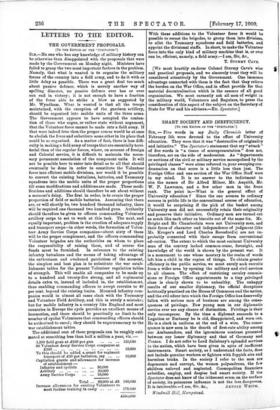LETTERS TO THE EDITOR.
THE GOVERNMENT PROPOSALS.
[TO THE EDITOR OP THE "SPECTATOR."]
Six,—No one who has any knowledge of military history can be otherwise than disappointed with the proposals that were made by the Government on Monday night. Ministers have failed to grasp the two most important factors in the problem. Namely, that what is wanted is to organise the military forces of the country into a field army, and to do it with as little delay as possible. There was a great deal too much about passive defence, which is merely another way of spelling disaster, no passive defence ever has or ever can end in victory; it is not enough to have a fraction of the force able to strike a blow as suggested by Mr. Wyndham. What is wanted is that all the troops maintained, with the exception of the garrison artillery, should be organised into mobile units of the three arms.
The Government appears to have accepted the conten- tion of those who argue, or rather state without argument, that the Volunteer force cannot be made into a field army. If that were indeed tree then the proper course would be at once to abolish the force and substitute some other in its place that could be so organised. As a matter of fact, there is less diffi- culty in making a field army of troops that are essentially terri- torial than of the regular forces, where, on account of foreign and Colonial service, it is difficult to maintain the neces- sary permanent association of the component units. It will not be possible here to enter into detail as to all that should eventually be done in order to constitute the Volunteer force into efficient mobile divisions, nor would it be possible to convert the existing battalions, batteries, and Yeomanry squadrons into the mobile units of the proper proportions till some modifications and additions are made. ,These modi- fications and additions should therefore be set about without a moment's delay. The first in order, is to create the proper proportion of field or mobile batteries. Assuming that there are, or will shortly be, two hundred thousand infantry, there will be required one thousand two hundred guns. Authority should therefore be given to officers commanding Volunteer artillery corps to set to work at this task. The next, and equally important, problem is the creation of adequate supply and transport corps—in other words, the formation of Volun- teer Army Service Corps companies—about sixty of these will be the proper complement, and the officers commanding Volunteer brigades are the authorities on whom to place the responsibility of raising them, and of course the funds must be furnished. In reference to the existing infantry battalions and the means of taking advantage of the enthusiasm and awakened patriotism of the moment, the simplest and best plan is to substitute the war estab- lishment tables for the present Volunteer regulation tables of strength. This will enable all companies to be made up to a hundred and twenty-five strong, and all regimental details extra to, instead of included in, the establishment, thus enabling commanding officers to accept recruits to 40 per cent. beyond the existing limits. Mounted infantry com- panies would in almost all cases clash with the Yeomanry and Volunteer Field Artillery, and this is surely a mistake ; but for mobile infantry in a country like England and most countries in Europe the cycle provides an excellent means of locomotion, and there should be practically no limit to the number of cyclist Volunteers that commanding officers should be authorised to enrol ; they should be supernumerary to the war establishment tables.
The additional cost of these proposals can be roughly esti- mated at something less than half a million a year, viz. :— 1,200 field guns at £100 per gun ... 120,600 60 Volunteer Army Service Corps companies at To this should be added a grant for regiment
transport of £50 per battalion, say ... ... 10,000 Capitation grants and allowances for increase of establishment:—
Infantry and cyclists ... 30,000 Artillery ... ... 20,000
Army Service Corps ... ... 10,000
Total ... 60,000 at £3 180,000 Increase allowances for existing Volunteers to meet further training in camp ... ... 178,000 £500,000 With these additions to the Volunteer force it would be possible to recast the brigades, to group them into divisions, to allot the Yeomanry squadrons and field batteries, and appoint the divisional staffs. In short, to make the Volunteer force into the only kind of military machine that is, or ever can be, efficient, namely, a field army.—I am, Sir, &c.,
T. STURM' Ca.v.c.
[We most heartily endorse Colonel Stormy Cave's wise and practical proposals, and we sincerely trust they will be considered attentively by the Government. One immense advantage connected with them is the fact that they relieve the burden on the War Office, and in effect provide for that material decentralisation which is the essence of all good organisation. We most earnestly ask all men of weight in the military world, Volunteers and Regulars, to press the consideration of this aspect of the subject on the Secretary of State for War and his advisers.—ED. Spectator.]






































 Previous page
Previous page